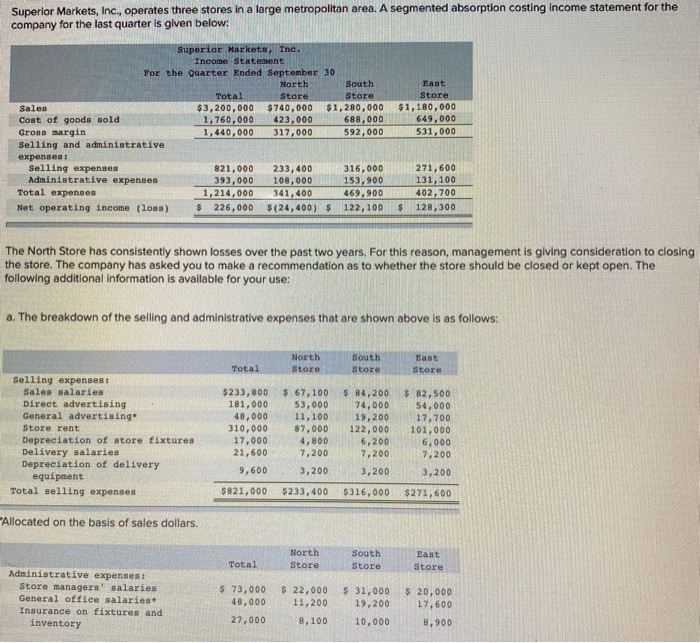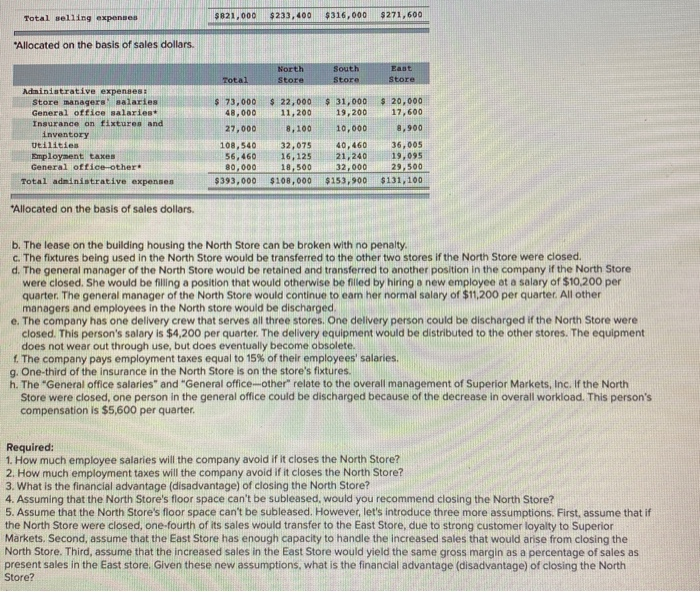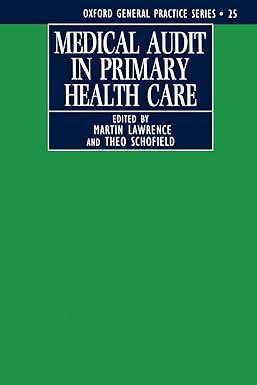Superior Markets, Inc., operates three stores in a large metropolitan area. A segmented absorption costing income statement for the company for the last quarter is given below: Superior Markets, Inc. Income Statement For the Quarter Ended September 30 North South Total Store Store Sales $3,200,000 $ 740,000 $1,280,000 Cost of goods sold 1,760,000 423,000 688,000 Gross margin 1,440,000 317,000 592,000 Selling and administrative expenses Selling expenses 821,000 233,400 316,000 Administrative expenses 393,000 108,000 153,900 Total expenses 1,214,000 341,400 469,900 Net operating income (loss) 226,000 $(24,400) $ 122, 100 East Store $1,180,000 649,000 531,000 271,600 131,100 402,700 128,300 $ $ The North Store has consistently shown losses over the past two years. For this reason, management is giving consideration to closing the store. The company has asked you to make a recommendation as to whether the store should be closed or kept open. The following additional information is available for your use: a. The breakdown of the selling and administrative expenses that are shown above is as follows: North Store Total South Store East Store Selling expenses Sales salaries Direct advertising General advertising Store rent Depreciation of store fixtures Delivery salaries Depreciation of delivery equipment Total selling expenses $233,800 181,000 48,000 310,000 17,000 21,600 9,600 $ 67,100 53,000 11,100 87,000 4,800 7,200 $ 84,200 74,000 19,200 122,000 6,200 7,200 3,200 $ 82,500 54,000 17,700 101,000 6,000 7,200 3,200 3,200 $821,000 $233,400 $316,000 $271, 600 "Allocated on the basis of sales dollars. Total North Store South Store East Store Administrative expenses Store managers' salaries General office salaries Insurance on fixtures and inventory $ 73,000 48,000 27,000 $ 22,000 11,200 8,100 $ 31,000 19,200 $ 20,000 17,600 8,900 10,000 Total welling expenses $821,000 $233, 400 $316,000 $271,600 *Allocated on the basis of sales dollars. North Store South Store East Store Total Administrative expenses Store managers salaries General office salaries+ Insurance on fixtures and inventory Utilities Employment taxes General office other Total administrative expenses $ 73,000 48,000 27,000 108,540 56,460 80,000 $393,000 $ 22,000 11,200 8,100 32,075 16,125 18,500 $100,000 $ 31,000 19,200 10,000 40, 460 21,240 32,000 $153,900 $ 20,000 17,600 8.900 36,005 19,095 29,500 $131,100 *Allocated on the basis of sales dollars. b. The lease on the building housing the North Store can be broken with no penalty. c. The fixtures being used in the North Store would be transferred to the other two stores if the North Store were closed. d. The general manager of the North Store would be retained and transferred to another position in the company if the North Store were closed. She would be filling a position that would otherwise be filled by hiring a new employee at a salary of $10,200 per quarter. The general manager of the North Store would continue to eam her normal salary of $11,200 per quarter. All other managers and employees in the North store would be discharged e. The company has one delivery crew that serves all three stores. One delivery person could be discharged if the North Store were closed. This person's salary is $4,200 per quarter. The delivery equipment would be distributed to the other stores. The equipment does not wear out through use, but does eventually become obsolete. 1. The company pays employment taxes equal to 15% of their employees' salaries. g. One-third of the insurance in the North Store is on the store's fixtures. h. The "General office salaries" and "General office-other relate to the overall management of Superior Markets, Inc. If the North Store were closed, one person in the general office could be discharged because of the decrease in overall workload. This person's compensation is $5,600 per quarter. Required: 1. How much employee salaries will the company avoid if it closes the North Store? 2. How much employment taxes will the company avoid if it closes the North Store? 3. What is the financial advantage (disadvantage) of closing the North Store? 4. Assuming that the North Store's floor space can't be subleased, would you recommend closing the North Store? 5. Assume that the North Store's floor space can't be subleased. However, let's introduce three more assumptions. First, assume that if the North Store were closed, one-fourth of its sales would transfer to the East Store, due to strong customer loyalty to Superior Markets. Second, assume that the East Store has enough capacity to handle the increased sales that would arise from closing the North Store. Third, assume that the increased sales in the East Store would yield the same gross margin as a percentage of sales as present sales in the East store. Given these new assumptions, what is the financial advantage (disadvantage) of closing the North Store








